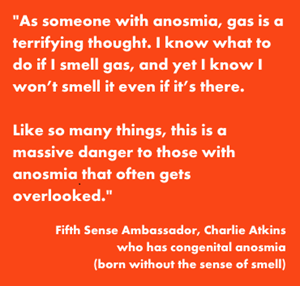We are the UK’s largest gas distribution network, bringing gas to 11 million homes and businesses. We manage a network of more than 82,000 miles of pipes, most of them underground

Most of us do not even realise what an important role the sense of smell plays in our lives and the problems people who are deprived of it face.
Our sense of smell does not only let us smell and distinguish the different aromas that things have it can also act as a main early warning system for our bodies and help keep us safe.
Sometimes people don’t realise that they have a loss or lack of ability to smell, medically known as anosmia.
The overall prevalence of smell disorders varies between 1 and 20% according to different European population surveys undertaken pre-covid. On the basis of the UK’s population as of mid-2020, this would suggest that between around 670,000 and 13,400,000 people in the UK could be affected by anosmia, the medical term for the loss or lack of ability to smell, meaning they may be at risk due to being unable to detect hazards such as spoiled food, gas and smoke.
These figures do not even include the significant number of people experiencing ongoing smell impairment following Covid-19 infection.
If you have a problem with your sense of smell and use gas appliances within your home, you are potentially at risk if there is a problem with your gas.
To help you stay safe at home, follow our four steps
Anosmia is the medical name for a condition in which someone suffers a partial or complete loss of their sense of smell.
As well as losing their sense of smell, people with anosmia may also suffer a reduced sense of taste, as these senses are very closely linked.
Most people are unable to smell at some point during their lives because of a cold or blocked nose, but people with anosmia may have it forever.
The most common single cause, either temporary or permanent, is illnesses which affect the nose or sinuses, such as polyps which grow in the airways, fractured bones or cartilage, hay fever or tumours.
Head injuries and nervous system diseases like Parkinson's or Alzheimer's may also contribute to the condition by damaging the nerves which are responsible for detecting smells. If these nerves are damaged the messages they send to the brain may be incomplete or stopped completely.
People may also inherit anosmia through their genes or develop it from other causes including liver failure, diabetes, or for no obvious reason at all.

We are working in partnership with SmellTaste to raise awareness of smell disorders.
SmellTaste is the charity for people affected by smell and taste disorders, providing support, information and educating society on the huge role that the senses of smell and taste play in our lives.
** The Impact of Olfactory Disorders in the United Kingdom Carl M. Philpott1,2 and Duncan Boak3
1Norwich Medical School, University of East Anglia, Norwich, UK, 2The Smell & Taste Clinic, James Paget University Hospital, Gorleston, UK, and 3SmellTaste, London, UK